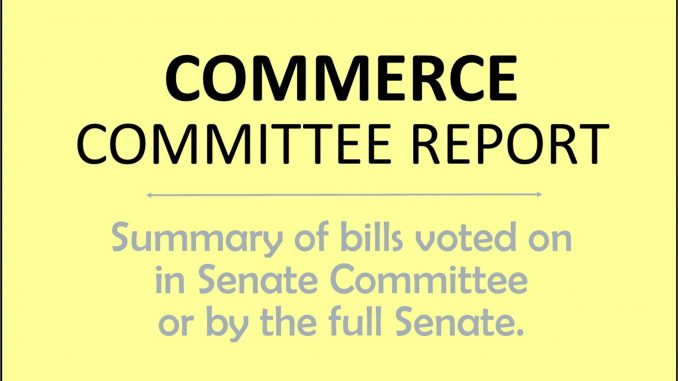
On this page
COMMITTEE ACTION:
SF 226 – Regulation of certain tobacco, hemp-related products
SF 226 (SF 43) requires a person who engages in the business of a device (paraphernalia) retailer through a retail outlet or delivery sales to hold a tobacco retailer permit, comply with provisions applicable to a tobacco retailer, sell tobacco products in addition to devices at the retail outlet or through delivery sales, and hold a permit as a device retailer. It provides for application for and issuance of annual device retailer permits by cities and counties (depending on the location of the retailer) and requires a $1,000 fee for each permit. The device retailer permit holders must keep certain records and submit reports to the Department of Revenue. A device retailer must not sell, give or otherwise supply a device to any person under 18 and must verify the age of all purchasers. A device retailer can only display and sell devices in a location that ensures that the devices are not visible to a person younger than 18 and where no person younger than 18 is present or permitted.
It provides for the imposition, collection and payment of sales and excise taxes on the retail sale, including delivery sales, of devices. It creates a “specialty courts program fund” to support specialty courts in addressing underlying substance use disorder-related and mental health-related issues that contribute to the contact of individuals with the justice system. Moneys collected, with the exception of city and county permit fees, will be deposited in the fund. The bill also sets various penalties for violations.
Additionally, it addresses claims made regarding hemp products sold at retail. Unless a state or federal agency has substantiated and approved the efficacy and safety claims of a product based on competent and reliable scientific evidence, a person engaging in the retail sale of a hemp product that contains hemp-derived cannabidiol, or in the retail sale of a cosmetic, personal care product, or product intended for human or animal consumption to which hemp-derived cannabidiol has been added in compliance with Code section 204.7(9), must include on the product’s principal display panel a statement that the product may contain the ingredients stated on the label, that the efficacy and safety of the product have not been substantiated or approved by a state or federal agency, and that the consumer should use the product at their own risk. A violation is a serious misdemeanor, as well as an unfair practice under Code 714.16. Provisions in Division II do not apply to a medical cannabidiol manufacturer licensed under Code Chapter 124E.
The bill will be referred to the Ways and Means Committee.
[2/2: short form (Excused: Lykam, Quirmbach, Wahls)]
SF 229 – Service charges on consumer credit loans
SF 229 (SSB 1048) modifies legislation enacted in 2019 that allows a service charge to be applied on certain types of regulated loans that are interest-bearing. The service charge is capped at $30, or 10% of the loan, not to exceed $30. Regulated companies such as Town Financial, headquartered in Des Moines, use pre-computed loans which are not considered interest-bearing under current law. The typical loans are small loans for appliances, auto repair, purchases of cars, home repairs and emergency circumstances that impact families. This bill allows a service charge to be applied to both interest- bearing and non-interest-bearing loan products. The Division of Banking and the Consumer Protection Division of the Attorney General’s Office oversee regulated loan companies. Representatives from both offices reviewed the proposed language over the interim and have no objections. The companion is HF 235.
[2/2: short form (Excused: Lykam, Quirmbach, Wahls)]
